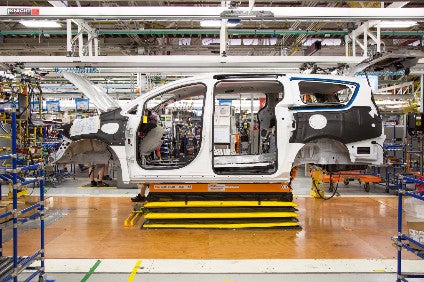
The Canadian automaking province of Ontario is to provide Fiat Chrysler Automobiles Canada (FCA) with a C$81m grant for the Windsor assembly plant which will soon start building an additional variant of the Pacifica, the first plug-in hybrid electric minivan made in North America.
FCA said it had $1bn invested already in the Windsor operations. The funding would help to create 1,200 new jobs and secure 4,000 existing positions at the plant. It will also support “thousands” of direct and indirect jobs across Ontario’s auto supply chain.

Discover B2B Marketing That Performs
Combine business intelligence and editorial excellence to reach engaged professionals across 36 leading media platforms.
A number of factors, including currency, relatively high labour costs, compared with rival countries such as Mexico, and binding multi-year union contracts have made it increasingly harder for Canadian and northern US ‘Detroit Three’ auto plants to win new vehicle production contracts. Automakers have shifted lower cost models to cheaper-labour countries like Mexico but continue to build more complex, higher-value (and more profitable) models such as trucks, large crossovers and CUVs in the northern factories.
The Pacifica is the latest generation of a segment the former Chrysler effectively invented for North America in 1983, starting with the Voyager/Caravan twins built on the K-car FWD platform. The seven-eight seat models were a smash hit (often dubbed ‘soccer moms’ cars’) as they were much easier to drive and park than the previous, full-size (up to 12 seats) van-based people carriers and they put the traditional six-to-nine-seat American station wagon out to grass. Other Detroit ‘Big Three’ rivals were soon launched but, in turn, SUVs and crossovers eventually encroached into minivan territory and some competitors were dropped. Today, Chrysler is again the main minivan player in the US and Canada (previous generations were also assembled in Austria and sold worldwide) with its Windsor-made line facing a limited number of rivals from mostly Japanese and Korean automakers and, outside, North America, smaller models made by Japanese, Korean and Euopean companies.
FCA said investments at Windsor enable vehicles to be built using an advanced global platform that provides flexibility to build different models and respond to changing market demand. The project also supports a greater use of lightweight materials and the capacity to build plug-in hybrid electric vehicles, both of which improve fuel economy and reduce emissions.
As just-auto saw during a recent trip to see some of the ‘connected car’ R&D work being done in the province, maintaining an innovative and sustainable auto sector is part of the government’s economic plan to develop Ontario and deliver the key priority of growing the economy and creating jobs. The four-part plan includes investing in talent and skills, including helping more people get and create the jobs of the future by expanding access to high-quality college and university education. The plan is making the largest investment in public infrastructure in Ontario’s history and investing in a low-carbon economy driven by innovative, high-growth, export-oriented businesses. The plan is also to help local workers achieve a more secure retirement.
“We are delighted that Fiat Chrysler chose Ontario to pioneer its first minivans using plug-in hybrid technology. Our support for this project signals our government’s long-term commitment to partner with the auto industry to develop and build the next generation of vehicles and help create high-quality jobs in communities across the province,” said Ontario premier Kathleen Wynne.
Fiat Chrysler directly employs around 11,000 people in Ontario with assembly plants in Windsor and Brampton, a stamping plant in Etobicoke, and a research and development centre in partnership with the University of Windsor.
Ford, General Motors, Honda, Toyota and Hino also manufacture vehicles in the province. GM last week said it would “significantly” expand its engineering and software development work at its Oshawa base and other facilities in Canada, creating about 700 jobs. It would build a major software development centre in Markham and upgrade its cold weather testing facility in Kapuskasing, doubling the length of its test track.
The province is spending $20m to work with the public and private sector to create a network of fast-charging electric vehicle stations in cities, along highways and at workplaces, apartments, condominiums and public places.
Ontario was the first Canadian province to allow on-road testing of automated vehicles and is home to almost 100 companies and institutions involved in connected vehicle and automated vehicle technologies.






